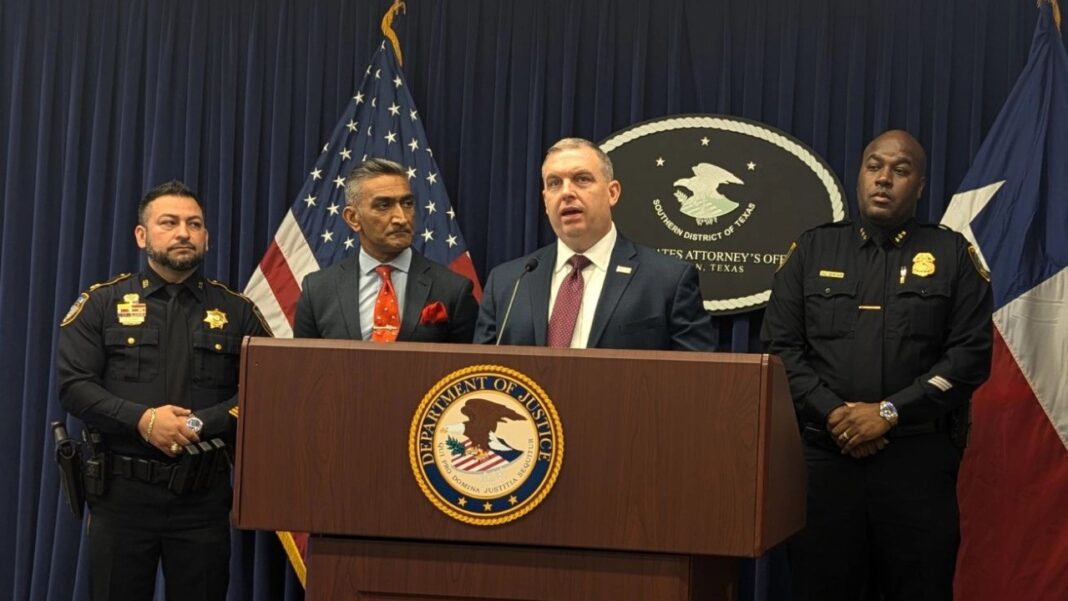|
Getting your Trinity Audio player ready...
|
By : Fern Sidman
In a recent development, the FBI has arrested Anas Said, a Houston resident, on charges related to supporting ISIS and making threats against Jewish and Israeli-affiliated locations in the United States. According to a report on the Vois Es Nais website, Said, who was detained outside his apartment last week, now faces federal charges for allegedly providing material support to a terrorist organization. His hearing is scheduled for Thursday afternoon, marking a pivotal moment in a case that has drawn significant attention to concerns around domestic extremism.
As Vois Es Nais reported, federal agents detail Said’s ongoing involvement with ISIS, allegedly dating back several years. Said reportedly admitted to attempting multiple times to join ISIS abroad and indicated his willingness to return to Lebanon if released. Prosecutors claim he went further, offering his Houston residence as a “safe sanctuary” for ISIS operatives, a step that cemented his commitment to aiding the organization. These revelations have heightened concerns about the ability of U.S.-based individuals to provide safe spaces for terrorist operations.
Revealed in the VIN report was that Said’s plans extended beyond general support for ISIS. The court filings indicate that he had actively researched various Jewish and Israeli-linked sites within Houston. His targets allegedly included synagogues and the Israeli Consulate, with Said reportedly studying security measures and layouts for potential attack planning. VIN further reported that Said expressed interest in confronting the leader of a local Jewish organization to demand the cessation of financial support to Israel. Said allegedly considered using violence if his demands were refused, a factor that has led to increased security measures at local Jewish institutions and other community sites.
The VIN report highlighted that Said’s radical views were not isolated expressions but frequently discussed within his own family. Said’s brother reportedly informed authorities that Said “openly acknowledged that he wants to fight against and kill proponents of Israel.” This admission not only calls attention to the extremity of Said’s views but also raises questions about the dynamics within families affected by radicalization and the role they may play in alerting authorities.
According to the information provided in the VIN report, the FBI’s involvement with Said dates back to 2017, when his online activities first attracted attention. During this period, the FBI reportedly observed Said creating and distributing ISIS propaganda, as well as forming an encrypted chat group intended to promote ISIS’s violent ideology. In a later conversation with an undercover FBI agent, Said allegedly voiced a desire to conduct a large-scale attack on U.S. soil. Said indicated that only his family’s presence had prevented him from acting on this ambition, hinting at plans for an attack akin to those of September 11, 2001. The undercover operation sheds light on the FBI’s strategies to prevent potential domestic terror attacks through preemptive monitoring and engagement with suspected extremists.
The case has sparked concern among Jewish organizations and local leaders, who, according to the report on the VIN website, are now prioritizing the safety of their communities. Jewish leaders have emphasized the need for vigilance, recognizing that even the mere threat of violence can have a profound impact on a community’s sense of security. Law enforcement agencies have reportedly increased patrols and security protocols at vulnerable locations, emphasizing the importance of safeguarding spaces potentially at risk from extremist ideologies.
Said’s case is a reminder of the complex challenges faced by law enforcement in countering domestic extremism. Federal prosecutors are expected to present additional evidence at Said’s hearing, potentially detailing the extent of his engagement with ISIS, his alleged plans for violence, and the scope of his online activities.


